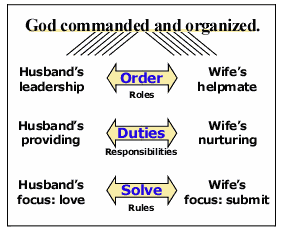

Godly Beginnings for the Family
Paul and Linda J. Bucknell
Godly Beginnings for the Family Index
Starting Families Right | Family Commitment | Family Planning | Husband & Wife Roles | Family Health Plan | Preparations for Childbirth | Tender Newborn Care | Challenge of Child Training | Disciplining & Training Small Children | Setting up Godly Routines
Marriage Roles for Father and Mother
Purpose
Marriage Roles for Father and Mother provides a biblical perspective of sex roles (male and female) and shows the influence on parenting. This is part of a larger series Godly Beginning for the Family.
Learning how to care for infants, before, during and after birth!
Conflict over husband and wife roles (sex roles) is one of the biggest reasons for conflict and bitterness in the family today. Conflict, inner tension and arguments occur because of expectations that arise from unknown assumptions over sex roles.
Again, this was not as much a problem in the past when roles were more clearly defined than today. But nothing seems straightforward today except that everyone should do his own thing!
God has given us great instructions in His Word for the design of the function of husbands and wives. Christians, however, often miss God’s instructions in this area of life because of their set of worldly assumptions.
God is very concerned with how our children are raised. How we raise them is greatly impacted by how we carry out our roles in the home. How we start will impact the final result. We cannot give a full treatment of this subject here, but let us focus on helping you biblically understand three kinds of couples.
Scenario #1: Odd Couple
This husband and wife are confused. They are convinced that for each other’s benefit they should take turns being husband and wife.
The wife wants to be fulfilled and have a career. She wants to have her freedom to roam and spend outside the home. Meanwhile the man thinks that in order to be a loving husband he is to be a mother for a while and give his wife a break. Although he couldn’t be pregnant, he wore a sack to help him sympathize with his wife.
He has taken leave from work to mother the baby. Of course he can’t nurse the baby either, but he can feed it a less nutritious bottle. There is a silent war between them. They pretend they are both happy but both are guilty and distressed.
What is God’s advice? The wife is to come home to mother as the scripture mandates. The husband is to believe that God has designed the mother to be enriched through her important mothering role.
“Older women likewise are to be reverent in their behavior, not malicious gossips, nor enslaved to much wine, teaching what is good, that they may encourage the young women to love their husbands, to love their children, to be sensible, pure, workers at home, kind, being subject to their own husbands, that the word of God may not be dishonored” (Titus 2:3-5).
Mothers are clearly to be workers at home. They need to be busy doing the things that God has specially crafted them to do.
(1) Women are designed to have children. (What an observation! Genesis 3:16; 4:1-2). |
(2) Women are alone designed to nurse a baby with the right kind of nutritious fluids (1 Thessalonians 2:7; Song of Songs 8:1). |
(3) Women are designed to be relationship-focused so that they can find fulfillment from caring for a child (1 Thessalonians 2:8). |
(4) Women are designed to be tender, soft, smooth and round with a sweet voice to comfort and care for an infant (Song of Songs 2:14). |
Men on the other hand should find a job that provides for his household. He is not to be lazy but diligent so that his family does not suffer.
Godly Beginnings for the Family
Learning how to care for infants, before, during and after birth!
Click to order download (pdf) with study questions, footnotes, etc. or get the powerpoints and handouts.
Click here to view back cover! Smaller | Larger
(1) Men are designed to work in order to provide for his household and help contribute to the welfare of the society (1 Timothy 5:8; 1 Thessalonians 2:9-11; Genesis 3:17-19). |
(2) Men are made to be strong so they can fight, work hard and protect their families and countries from enemies (1 Timothy 6:12; Numbers 1:22; Song of Songs 3:8). |
(3) Men are designed to be the leaders who are able to pass instruction on to others (1 Timothy 2:12-13; 1 Thessalonians 2:10-11; Deuteronomy 6:1-7). |
Scenario #2: Semi-Modern
The semi-modern husband and wife try real hard to have a good marriage. From the outside everything seems well, but underneath several troublesome spots continue to gnaw at them. These conflicts come from not clearly working out the roles of the husband and wife.
As long as responsibilities are not clearly defined, the spouses become aggravated with each other. The wife might expect the husband to help in the area of caring for the child. The husband on the other hand keeps hinting how the wife can get a job and help relieve the financial situation. Down deep they become bitter because the other spouse is not fulfilling their own expectations. Their relationship works but is tense and not joyful.
What is God’s advice? The couple needs to recognize and straighten out several issues regarding their marriage.
(1) Responsibilities flow from ones roles.
The husband and wife should clearly mark off their areas of responsibility. They should not expect the other spouse to help out. For example, the husband should get a good sleep to perform well at work. The wife should care for the children’s need (such as a burping). The husband of course can help out especially when he sees a need. This is love in action. The wife should not begrudge her husband if he doesn’t help her. She should instead look to God for strength and love to help the crying child.
The husband should take pressure off the wife to work outside the home. He should instead support her in her efforts. He needs to provide instruction for the home and children and not think his wife should regularly do this. He needs to care for the needs of the house. In either case neither of them should demand or expect the other to fulfill responsibilities that are their own.
(2) Solve issues
When a spouse senses inner tension because of what the other spouse is or is not doing, he or she should go before the Lord to discern where the expectations or frustrations come from. For instance, if a wife finds herself distant from her husband, then she should understand that there is a problem beneath the surface.
The same is true when a man gets angry. Get beneath the surface and figure out why one might get easily angered. We understand that not all problems are because of different understandings of ones responsibilities but many are.
Once the problem is figured out, you should first see if you could adjust your expectations. If your love doesn’t seem to ‘cover a multitude of sins’ in this case, then the husband and wife need to talk about the problem at a convenient and private time.
The husband needs to speak gently so that the wife can understand the issue. He gives her time to think and sort out her feelings. The wife needs to respectfully bring the issue to her husband’s attention and allow him to lead the discussion.
For example, tension occurs over the husband’s dislike for the way the wife conducts her housecleaning. He thinks the house is cluttered or dirty. He should first express appreciation for her work but ask that she would do a better job with cleaning. He might need to pinpoint what he doesn’t like and the reason why. She probably never thought of it as a problem. When he sees her faithfulness to him, he should take notice and encourage her at least verbally or maybe with a little note.
Recently, my wife has mentioned the slow laundry sink drain. I sense some tension when she says this. As I think about it, my frustrations are partly about how the problem reoccurs. I try not to let that irritant affect my response to her.
I think of a temporary solution of pouring some acid down the drain. I think, “She can do that!” In other words, that is simple housework. But then as I further think through how she could do it, I remember that the acid is strong. I better handle it. I start devising a long-term plan to get that stuffed up pipe replaced. I should tell her my plans so that she knows I have been paying attention to her needs. I haven’t totally forgotten her request. That is being thoughtful. This last part is the most difficult part for me.
(3) Anticipating change in new situations
A couple facing new situations should realize that tensions increase because responsibilities change, or physical and emotional stamina alter. Ideally the husband should notice these changes and lead a discussion on how the changes need to be met.
This might be a simple situation like the whole family regularly attending a Friday night meeting or special times like having a baby. If it is the latter, the husband should make sure his wife finds some extra help during this time whether it means having a Grandma come or that he pitches in to help.
It is important to remember that the husband and wife’s distinct roles do not imply that a duty is below the dignity of the other. The husband can change a diaper. The wife can take out the garbage. The point of roles is to help each spouse faithfully fulfill his or her responsibility.
Our roles remind us also that the husband and wife should be content with what God has given them to do on earth. He has so designed us. We can be at peace with this. The wife must be at peace being home and forget about the world’s inference that she is not doing her best or that she is missing out on life. Our roles are designed by God and for the purpose He has for each sex as stated in the above scriptures.
Scenario #3: Biblical Model
The husband and wife love to be married. They love to be together. They have differences of opinion, but they work out the problems together before the Lord. Most importantly, she has learned how to subject herself to her husband in the Lord.
As far as she remembers, he hasn’t asked her to do evil. She is happy her husband takes good leadership of the home. He leads in family devotions. In fact, he is up before work meeting with the Lord and praying for his family and other matters. The husband makes sure he pays attention to special needs around the home and regularly looks for ways to express his love to his wife.
 What is God’s advice? Keep it up! God delights in good marriages. There are two keys to a good marriage: (1) Faithful in carrying out ones responsibilities and (2) rightly relating and responding to ones spouse.
What is God’s advice? Keep it up! God delights in good marriages. There are two keys to a good marriage: (1) Faithful in carrying out ones responsibilities and (2) rightly relating and responding to ones spouse.
(1) Clearly defined and kept roles help clarify responsibilities and minimize conflict. This has us faithfully responding to God and how we are to manage our affairs. We have discussed this above.
(2) Clear understanding and application of God’s commands for the husband and wife enable them to communicate well when there are misunderstandings. They have a way to solve problems and leave them in God’s hands. When the husband leads well, then it is easy for the wife to follow. The husband needs to focus on loving his wife. This means practical and deliberate ways to show kindness to his wife. He thinks of her needs and meets them. This includes something so basic as praying for her.
The wife is his helpmate. When she has a greater understanding how she fits into God’s role, it is easier for her to submit and work hard at doing what would please her husband and God. The wife needs to stop just saying she knows what her husband wants but in fact does those things. Her reluctance to submit to her husband produces ongoing tension and friction.
Summary
Faithfulness in following God’s scriptural guidelines goes a long way in providing a beautiful model for the child to grow and learn. If couples do not start out right, then misunderstandings quickly develop between them.
Bitterness is stored up and a wall of mistrust builds up. The children learn from this and learn how to reject authority. This leads to all sorts of hardships in the marriage that is transferred over to the children. By starting off right, our children can instead learn love, respect for authority, self-control and how to solve conflict.
|
Next => God's Family Health Plan
Once we start looking at the scriptures, we are astounded how much God speaks about our health. God really does care for us. We need only to obey.













